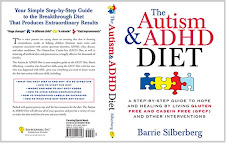
I have officially gone nuts over coconut and had to share the benefits of this wonderful food with you all. The benefits of coconut oil are not only for our kids on the spectrum but for every BODY. It is really amazing the healing properties of such an unattractive fruit.
I stumbled onto the nutritional benefits of coconut in relationship to autism about a year ago and continue to hear about the wonderful improvements others are experiencing.
Hear are just a few of the many benefits on and off the spectrum. It is a wonder that more people do not indulge in this wonderfilled fruit.
Brain - The Brain tissue is very rich in complex forms fats needed for proper neural transmission. Every brain needs to have the proper fats and ratios to produce brain health and improve conductivity. Coconut oil has been shown to increase brain function.
Immunity - Coconut oil is good for the immune system. It strengthens the immune system as it contains antimicrobial lipids, lauric acid, capric acid and caprylic acid which have anti fungal, antibacterial and antiviral properties. The human body converts lauric acid into monolaurin which is claimed to help in dealing with viruses and bacteria causing diseases such as herpes, influenza, cytomegalovirus, and even HIV. It helps in fighting harmful bacteria such as listeria monocytogenes and heliobacter pylori, and harmful protozoa such as giardia lamblia.
Skin - Coconut oil is beneficial in treating various skin problems including psoriasis, dermatitis, skin infections and eczema (which many of our kids suffer from due to diet).
Digestion - Coconut helps improve the digestive process and can also prevent various stomach and digestive problems. Due to the anti microbial properties coconut oil helps in dealing with various bacteria (YEAST), fungi and parasites. Coconut oil also helps in absorption of other nutrients such as vitamins, minerals and amino acids (especially calcium).
Infections - Coconut oil is very effective against a variety of infections due to its antifungal, antiviral, and antibacterial properties. According to the Coconut Research Center, coconut oil kills viruses that cause influenza, measles, hepatitis, herpes, SARS, etc. It also kills bacteria that cause ulcers, throat infections, urinary tract infections, pneumonia, and gonorrhea, etc. Coconut oil is also effective on fungi and yeast that cause candidiasis, ringworm, athlete's foot, thrush, diaper rash, and more.
For Us Moms (and Dads)
Promotes weight loss
Supports healthy metabolic function
Provides an immediate source of energy
Helps keep skin soft and smooth
Helps protect against skin cancer and other blemishes
Helps prevent premature aging and wrinkling of the skin
Reduces risk of atherosclerosis and related illnesses
Helps prevent osteoporosis
Helps control diabetes
How to use VCO (virgin Coconut Oil)?
CHILDREN: A reasonable amount to add to the diet of a child would be about ¼ teaspoon of coconut oil for every 10 pounds that the child weighs, 2 or 3 times a day. Also, some children may like the taste of coconut milk, in which case about 1 ½ to 2 teaspoons can be added to the diet 2 or 3 times a day. If you use coconut milk be sure to refrigerate it and toss after two days if using coconut milk for a child.
ADULTS: Researchers state that the optimal amount for an adult is between 3 and 4 tablespoons per day three times a day at meal times. It us recommend that you begin with a smaller amount and build up to the recommended dosage if necessary.
- Cooking oil: Since it is a stable cooking oil, one can simply replace unhealthy oils in the diet
- Spread: VCO at room temperature can be used as a butter or margarine substitute for spreads or for baking.
- Recipe replacement: Any recipe calling for butter, margarine, or any other oil can be substituted with VCO.
- Spoonful: Many people simply eat it by the spoonful.
- Directly into food.
- External applications: VCO can also be massaged into the skin and in the hair.
FOOD IDEAS
Use coconut oil instead of butter on toast, English muffins, bagels, grits, corn on the cob, potatoes or sweet potatoes.
Mix coconut oil into hot cereal.
Add coconut oil or coconut milk to your favorite smoothie recipe.
Mix coconut oil into rice, vegetables, noodles, pasta.
Mix coconut oil half and half with salad dressings. If the salad dressing is cold from the refrigerator, pour some into a small bowl, or other microwavable container, and warm it for about 10-12 seconds in a microwave oven and then add the coconut oil. If added to cold liquids or foods, coconut oil tends to harden.
Mix coconut oil into your favorite soup, chili or spaghetti sauce. Use a measured amount of coconut oil to stir fry or sauté any of your favorite dishes.
RECIPE:
Nut Butter
Ingredients:
2 cups (480 ml) Crispy nuts, such as peanuts, almonds, or cashews
3/4 cup (180 ml) Omega Nutrition Coconut Oil
2 Tbsp (30 ml) Raw honey
1 tsp (5 ml) Sea salt
Directions: Place nuts and sea salt in a food processor, and grind to a fine powder. Add honey and Coconut Oil, and process until "butter" becomes smooth. The resulting "butter" will be somewhat liquid, but will harden when chilled. Store in an airtight container in the refrigerator. Serve at room temperature.









After I wrote this article I have learned a great deal about the use of coconut in terms of hypothryroid and hashimoto's disease. This might be of interesting for some of you. Let me know.
ReplyDelete